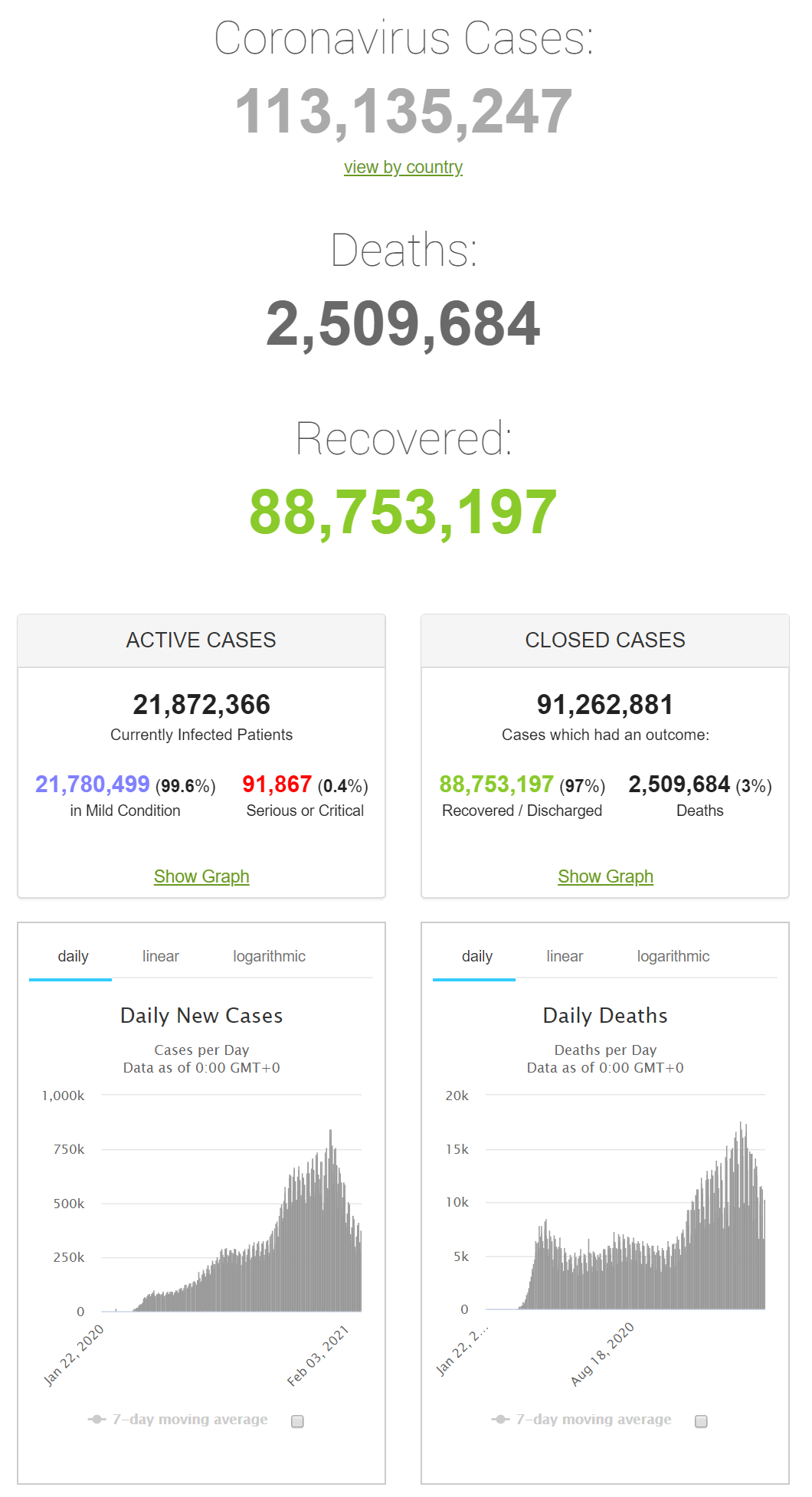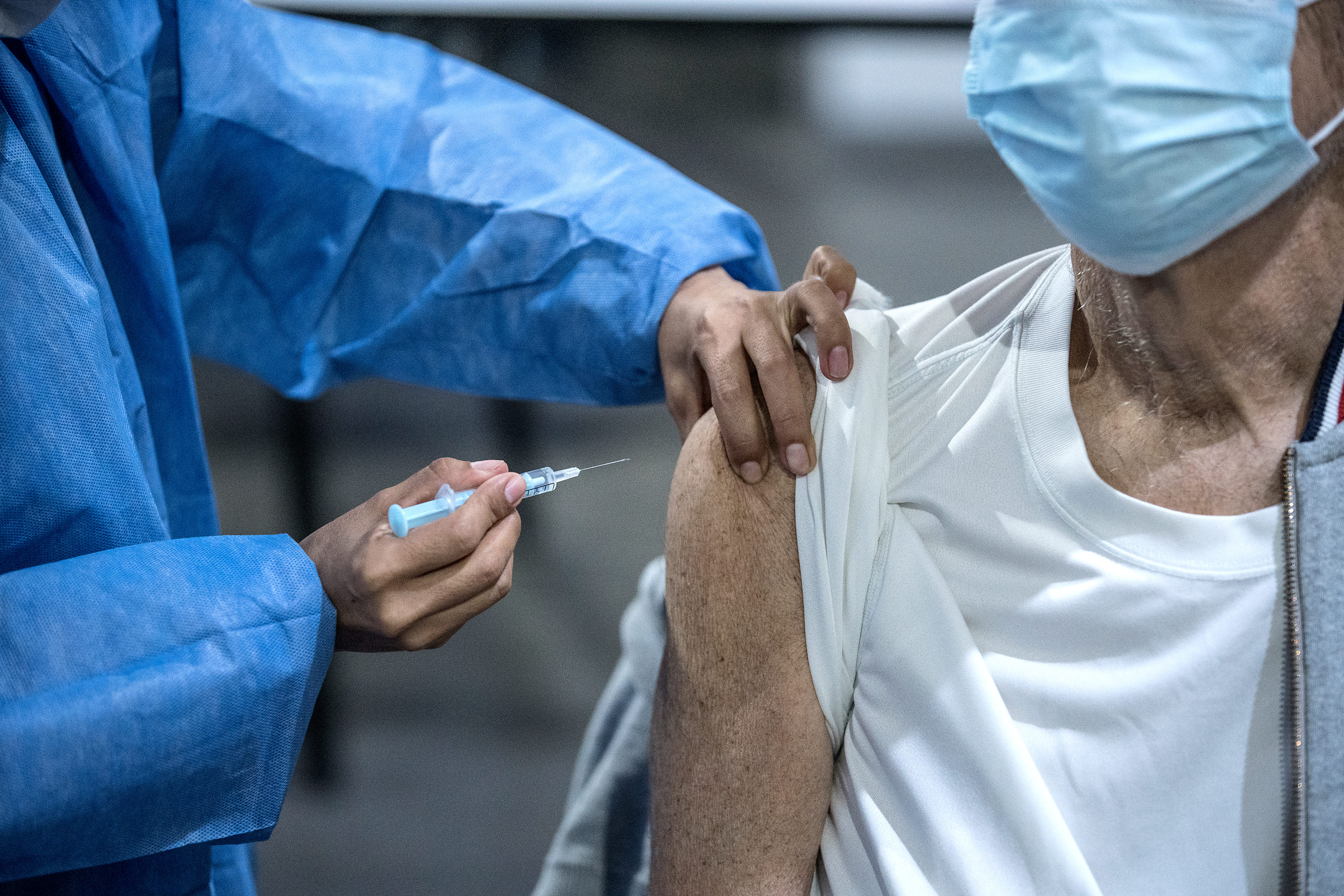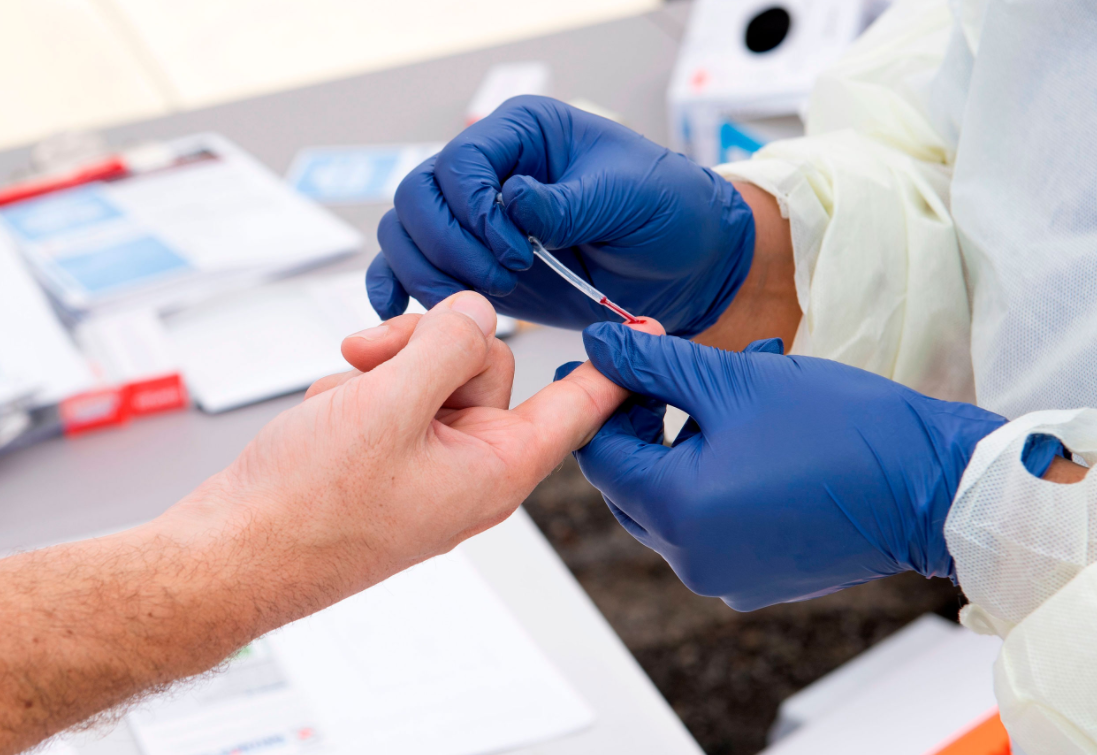
 i_need_contribute
i_need_contribute


|
Country, |
Total |
New |
Total |
|
World |
113,083,719 |
+438,570 |
2,507,820 |
|
28,974,623 |
+75,299 |
518,363 |
|
|
11,046,470 |
+17,144 |
156,742 |
|
|
10,326,008 |
+65,387 |
250,079 |
|
|
4,200,902 |
+11,749 |
84,430 |
|
|
4,144,577 |
+9,938 |
121,747 |
|
|
3,661,410 |
+31,519 |
85,321 |
|
|
3,170,644 |
+9,212 |
68,468 |
|
|
2,848,564 |
+16,424 |
96,666 |
|
|
2,665,194 |
+9,561 |
28,285 |
|
|
2,416,037 |
+10,774 |
69,610 |
|
|
2,237,542 |
+3,953 |
59,260 |
|
|
2,085,411 |
+8,183 |
51,650 |
|
|
2,052,266 |
+8,634 |
181,809 |
|
|
1,661,109 |
+12,146 |
42,808 |
|
|
1,598,875 |
+8,270 |
59,736 |
|
|
1,507,448 |
+1,862 |
49,523 |
|
|
1,317,694 |
+5,850 |
25,461 |
|
|
1,306,141 |
+7,533 |
35,254 |
|
|
1,300,799 |
+7,302 |
45,683 |
|
|
1,184,511 |
+15,815 |
19,768 |
|
|
1,068,960 |
+4,362 |
15,406 |
|
|
855,126 |
+2,857 |
21,807 |
|
|
807,872 |
+2,555 |
20,173 |
|
|
800,586 |
+1,480 |
16,136 |
|
|
788,048 |
+3,337 |
20,086 |
|
|
763,756 |
+4,184 |
5,660 |
|
|
757,696 |
+2,102 |
21,956 |
|
|
680,288 |
+4,306 |
13,324 |
|
|
574,580 |
+1,196 |
12,708 |
|
|
566,420 |
+1,557 |
12,129 |
|
|
544,544 |
+428 |
8,379 |
|
|
482,128 |
+419 |
8,592 |
|
|
450,376 |
+2,006 |
8,470 |
|
|
446,313 |
+3,460 |
4,383 |
|
|
427,467 |
+1,011 |
7,584 |
|
|
410,129 |
+2,855 |
14,552 |
|
|
378,637 |
+3,102 |
1,164 |
|
|
376,441 |
+4,024 |
4,611 |
|
|
376,021 |
+353 |
6,475 |
|
|
362,850 |
+3,513 |
4,508 |
|
|
338,701 |
+896 |
5,789 |
|
|
298,337 |
+3,547 |
6,775 |
|
|
291,774 |
+3,545 |
1,088 |
|
|
281,707 |
+1,279 |
1,939 |
|
|
278,779 |
+2,999 |
15,634 |
|
|
273,760 |
+94 |
2,684 |
|
|
269,438 |
+443 |
3,463 |
|
|
244,380 |
+1,204 |
11,508 |
|
|
242,124 |
+1,733 |
10,026 |
|
|
241,048 |
+688 |
5,477 |
|
|
236,883 |
+673 |
3,066 |
|
|
233,644 |
+220 |
3,206 |
|
|
230,443 |
+662 |
7,869 |
|
|
216,870 |
+570 |
4,237 |
|
|
209,562 |
+753 |
2,540 |
|
|
209,079 |
+523 |
2,345 |
|
|
203,496 |
+399 |
2,793 |
|
|
195,509 |
+659 |
3,203 |
|
|
187,005 |
+1,089 |
3,802 |
|
|
187,005 |
+1,001 |
1,062 |
|
|
184,686 |
+1,903 |
6,371 |
|
|
180,150 |
+1,610 |
3,846 |
|
|
180,051 |
+644 |
10,495 |
|
|
177,768 |
+1,391 |
1,999 |
|
|
172,764 |
+692 |
6,327 |
|
|
170,945 |
+273 |
3,175 |
|
|
166,547 |
+810 |
4,040 |
|
|
161,803 |
+459 |
257 |
|
|
155,234 |
+977 |
2,316 |
|
|
154,904 |
+1,114 |
3,119 |
|
|
153,842 |
+655 |
1,885 |
|
|
141,816 |
+33 |
3,197 |
|
|
140,300 |
+311 |
1,558 |
|
|
137,445 |
+459 |
1,331 |
|
|
131,262 |
+561 |
2,151 |
|
|
119,858 |
+653 |
437 |
|
|
112,461 |
+182 |
2,970 |
|
|
104,780 |
+280 |
1,839 |
|
|
103,327 |
+1,021 |
1,715 |
|
|
100,632 |
+715 |
3,098 |
|
|
89,864 |
+12 |
4,636 |
|
|
88,120 |
+439 |
1,576 |
|
|
86,025 |
+24 |
1,460 |
|
|
83,445 |
+983 |
1,587 |
|
|
81,245 |
+486 |
584 |
|
|
79,749 |
+32 |
622 |
|
|
76,484 |
+902 |
1,051 |
|
|
73,612 |
+643 |
976 |
|
|
69,489 |
+341 |
620 |
|
|
60,475 |
+1,069 |
557 |
|
|
59,890 |
+7 |
29 |
|
|
8,892 |
+12 |
170 |
|
|
7,775 |
+40 |
71 |
|
|
2,412 |
+11 |
35 |
Retrieved from: https://www.worldometers.info/coronavirus/
From CNN's Sarah Faidell and Junko Ogura

The Olympic cauldron is lit during the 'Flame of Recovery' exhibition on March 25, 2020, in Iwaki, Japan. Clive Rose/Getty Images
The Tokyo 2020 Olympic Torch Relay will start in Fukushima prefecture on March 25, 2021 with several Covid-19 countermeasures in place, officials announced on Thursday.
The Olympics were originally scheduled for last summer, but were postponed until this year due to the pandemic. In recent months, the Games have been a point of controversy, with rumors of cancelations as Japan deals with a vicious wave of cases -- but authorities have insisted the event will go ahead.
The torch will first go through regions affected by the devastating 2011 Tohoku earthquake and tsunami marking the disaster's 10th anniversary, before traveling “around every corner of Japan," officials said.
Covid-19 countermeasures include avoiding “the 3 C’s: closed spaces, crowded places, close-contact settings.” Those who wish to view the relay from the roadside must wear masks, stay home if they feel unwell, and refrain from traveling outside the prefecture they live in.
Spectators are also told to “support with applause or by using distributed goods rather than by shouting or cheering.” The relay will also be streamed live online.
Torchbearers will be required to fill out a daily health checklist two weeks before the relay and refrain from activities that may involve a risk of infection, such as eating out or going to crowded places, officials advised.
“The Olympic Torch Relay will be an event for everyone, and amidst the global threat of Covid-19, it will give hope and courage to people all over Japan,” Tokyo 2020 officials said in the statement Thursday.
Covid cases: The announcement comes as Japan recorded 912 new infections and 63 deaths from Wednesday, according to the country's health ministry. That raises the national total to 429,265 cases and 7,660 deaths.
From CNN’s Tatiana Arias in Atlanta

A healthcare worker administers a dose of the AstraZeneca Covid-19 vaccine at a vaccination center in Buenos Aires, Argentina, on Monday, February 22. Sarah Pabst/Bloomberg/Getty Images
The Americas region, including the US, is seeing a drop in Covid-19 cases -- but the infection rate is almost the same as the middle of last year, according to the Pan American Health Organization (PAHO).
Most Latin American countries are reporting a drop in new cases, “but the virus continues to spread at levels roughly equivalent to those that we saw mid last year when many countries were sounding the alarm,” said PAHO Director Carissa Etienne on Wednesday.
Although the Americas are seeing a reduction in cases, and vaccination campaigns have begun in at least 28 countries and territories, “it will be months before we see vaccinations impact the rate of Covid-19 infections, even in places like the United States, where immunization campaigns have been active for weeks," she said.
Approximately 78 million people have been vaccinated in the Americas and the Caribbean -- but it's not enough, Etienne said.
“The lifesaving power of vaccines should not be a privilege for the few, but a right for all, especially for the countries at greatest risk, like those in the Americas, who remain the epicenter of the pandemic," she said, adding that vaccines are "safe and effective."
"Our region needs vaccines, as soon as possible and as many as possible to save lives,” she said.
From CNN's Jacqueline Howard

A health worker takes a drop of blood for a Covid-19 antibody test at the Diagnostic and Wellness Center in Torrance, California, on May 5, 2020. Valerie Macon/AFP/Getty Images
Covid-19 antibodies from a previous infection could significantly lower your risk of becoming re-infected, according to a study published Wednesday in the journal JAMA Internal Medicine.
"The results from the study are basically a 10-fold reduction, but I would have caveats around that. In other words, it could be an overestimate of the reduction, it could be an underestimate of the reduction," said Dr. Douglas Lowy, principal deputy director of the National Cancer Institute, who was an author of the study.
"To me, the big message is -- there’s a reduction," he said. "The main takeaway is that being antibody positive after natural infection is associated with partial protection against a new infection."
How they did the study: The researchers examined data on more than 3.2 million people in the United States who had completed an antibody test last year between January and August.
Among those tested, 11.6% tested positive for Covid-19 antibodies and 88.3% tested negative.
0.3% of those with antibodies tested positive for Covid-19 infection later, beyond 90 days.
3% of those without antibodies tested positive for reinfection during the same time period.
But more research is needed to determine a causal relationship, how long protection from antibodies may last, and the risk of reinfection from a variant.
https://edition.cnn.com/world/live-news/coronavirus-pandemic-vaccine-updates-02-25-21/index.html

A school that reopened in Accra, Ghana, last month. The country has received a shipment of 600,000 vaccine doses.Credit...Nipah Dennis/Agence France-Presse — Getty Images
The global sharing program designed to make vaccine access more equal delivered its first major shipment of doses on Wednesday to the West African nation of Ghana, ramping up the largest mass immunization campaign in history.
“Today marks the historic moment for which we have been planning and working so hard,” said Henrietta Fore, the executive director of UNICEF. “In the days ahead, frontline workers will begin to receive vaccines, and the next phase in the fight against this disease can begin.”
The first shipment of 600,000 doses was packed up and labeled in India, then flown to Accra, the Ghanaian capital.
Ghana and other West African countries are to begin vaccinations in coming days, according to officials, the first of 92 low and middle-income countries that will receive free vaccines through Covax, a vaccine-sharing initiative.
The goal is for Covax to deliver some two billion doses of Covid-19 shots this year, which officials said would make it the largest vaccine procurement and supply operation in history.
The shipment arrived in West Africa as studies were released suggesting that the spread of the virus in the region has been much wider than official numbers show.
At least one in five people in Lagos, Nigeria, could have had contracted the coronavirus by October last year, according to findings just released by the Nigeria Center for Disease Control, an infection rate far higher than the one reported through the national surveillance system. A study in Accra released in November had similar findings.
Many public health officials have criticized the unequal distribution of vaccines — with wealthy nations already delivering tens of millions of doses and acquiring vast reserves for their populations.
For instance, while at least 44.5 million Americans and around 18 million people in Britain have already received a shot, as of last week more than 130 countries had yet to vaccinate a single person. The Ghana shipment covers just 1 percent of the population.
The United Nations secretary-general, António Guterres, said last week that the distributions had been “wildly uneven and unfair.”
And high-income countries are not respecting contracts under Covax and are competing with them, reducing the number of doses the initiative can buy, Dr. Tedros Adhanom Ghebreyesus, the head of the World Health Organization, said on Tuesday.
The pandemic will not end, he added, until everyone is vaccinated.
“This is not a matter of charity,” he said. “It’s a matter of epidemiology.”
Last week, the group of wealthy industrialized nations known as the Group of 7 announced that they would intensify their cooperation with the international vaccination drive and raised their overall commitment to the effort to $7.5 billion.
But Dr. Tedros said that there remained a financing gap of $23 billion.
President Emmanuel Macron of France called for even more urgent action on Friday, saying Europe and the United States should send up to 5 percent of their vaccine supplies to developing nations.
But even if things go according to plan, vaccinating the vast majority of the world’s most vulnerable people this year will be a daunting challenge.
Ghana, a nation of more than 30 million people, will get enough vaccines to cover only about 20 percent of its population by the end of 2021. It will have to buy millions more doses separately.
Poorer countries do not pay to purchase vaccines and injection devices under Covax, at least for up to 20 percent of the population. But they do have to pay the costs of delivery within the country.
To receive vaccines, countries had to submit plans saying who they wanted to immunize, how they would go about it and how they would monitor vaccinations. They also had to sign an indemnity agreement with the vaccine manufacturer.
“No country was prioritized,” said Benjamin Schreiber, UNICEF’s coordinator for the Covax program.
Four countries eligible to apply for vaccines under Covax did not do so: Burundi, Eritrea, Madagascar and Tanzania.
Retrieved from: https://www.nytimes.com/2021/02/24/world/ghana-covax-vaccine.html

Handing out literature about domestic violence in the Bronx in April.Credit...Stephanie Keith for The New York Times
A meta-analysis of studies released on Wednesday affirmed what social workers, educators and law enforcement officials have warned about for months: Stay-at-home orders exacerbated domestic violence. Reports increased more than 8 percent since the widespread lockdowns in the United States began last spring.
The report, released by a University of Miami sociology professor, Alex R. Piquero, and the National Commission on Covid-19 and Criminal Justice, is based on 18 studies covering communities in the United States and overseas. It compared changes in the number of domestic violence events before and after lockdowns began.
The studies measured changes in police calls for service, crime and incident reports, domestic violence hotline registries, and health records, using data derived from official records. The studies did not use qualitative or anecdotal evidence.
“We were able to quantify, in large and small U.S. cities and some worldwide, a broad view of the impact that the pandemic has had on domestic violence,” Mr. Piquero, the lead author of the report, said in an interview.
Even before this study, with only limited data available, the situation was deemed so grave that the World Health Organization and the United Nations called for action to protect children from violence amid lockdowns.
When the researchers factored in data from a few countries outside the United States — including Argentina, Italy, Mexico and Sweden — they found that the rate of domestic violence was only slightly lower.
Given that domestic violence is one of the most underreported crimes, Mr. Piquero said that the report’s findings were most likely an underestimate.
“This is a floor, not a ceiling, with regard to the true veracity of what the pandemic did to domestic violence,” he said.
The report reiterated what was already evident in anecdotal accounts of domestic violence during the pandemic: The lockdowns forced adults and children to stay in close quarters with their abusers, and the orders cut them off from friends, neighbors, colleagues and others who could report signs of abuse or help victims escape violent situations.
The economic impact of the pandemic also exacerbated factors already associated with domestic violence, including male unemployment, financial insecurity, and alcohol and other substance use, according to the study.
The group that compiled the study, the National Commission on Covid-19, was created by the Council on Criminal Justice, a think tank that studies criminal justice policies. It is led by a bipartisan pair of former attorneys general: Alberto Gonzales, a Republican, and Loretta Lynch, a Democrat.
The commission aims to assess the pandemic’s impact on the justice system; it includes judges, law enforcement officials, a defense lawyer, a researcher, and community and religious leaders.
The commission said that its findings highlighted a serious need for more domestic abuse prevention and services for survivors. It said the need was especially urgent among historically marginalized groups and those likely to be disproportionately isolated during the pandemic, such as older adults, people struggling with mental illness and chronic health conditions, and women and children with past experiences of violence and abuse.
Retrieved from: https://www.nytimes.com/live/2021/02/24/world/covid-19-coronavirus/domestic-violence-has-increased-during-the-pandemic-studies-show
A Danish study suggests that people infected with a British variant of the coronavirus codenamed B117 may have a 60% higher risk of being hospitalised, health minister Magus Heunicke has said.
A large-scale virus-sequencing campaign has allowed Denmark, population 5.8 million, to track the rise of the new variant more closely than any other country.
Camilla Holten Møller, of the Statens Serum Institute which is modelling the pandemic, said last month: “If we look at our models, this is the calm before the storm.”
There are fears that B.1.1.7 could soon become the dominant variant in the country. Holten Møller’s estimated that the variant spreads 1.55 times faster than previous variants.
UK prime minister Boris Johnson said in January:
In addition to spreading more quickly, it also now appears that there is some evidence that the new variant - the variant that was first identified in London and the south east - may be associated with a higher degree of mortality.
Early indications have suggested the variant spreads between 30% and 70% faster than others, and there were originally hints it is about 30% more deadly.
Here are the key developments from the last few hours:
· Toronto cancels outdoor events through July. Canada’s largest city Toronto is cancelling all large in-person, city-permitted outdoor events through July as the country seeks to stave off a third wave of the coronavirus pandemic.
· A new coronavirus variant is on the rise in New York City, researchers said on Wednesday. The new variant, known as B.1.526, was first identified in samples collected in New York in November, and by mid-February represented about 12% of cases, researchers at Columbia University Vagelos College of Physicians and Surgeons, said on Wednesday.
· India reported its highest cases in nearly a month. India reported 16,738 new coronavirus infections, health ministry data showed on Thursday, for the highest daily jump since January 29, according to a Reuters tally. More than half came from the western state of Maharashtra, India’s richest and home to its financial capital of Mumbai, which reported a record high of 8,807 cases on Wednesday.
· Olympic torch audience asked to applaud rather than cheer passing runners. People who turn out to catch a glimpse of the Olympic torch after it begins its journey through Japan at the end of the next month will be asked to applaud, rather than cheer passing runners, and the event could be suspended if crowds lining the relay route grow too large.
· One of UK’s largest care home firms introduced a ‘no jab, no job’ policy. One of the UK’s largest care home operators has instituted a no jab, no job policy for new staff amid ongoing concern about vaccine take-up among care workers.
· California vaccine sites are seeing a misuse of codes meant to prioritise Black and Latino residents. Access codes meant to give Californians of colour priority access to Covid-19 vaccine slots have been getting passed around among other residents in the state, allowing some to cut the line and get appointments meant for underserved Black and Latino residents.
· China’s Sinopharm vaccine 72.5% effective, company says. China is moving ahead with two more Covid vaccines in the regulatory process, one from state-owned company Sinopharm and another from a private company CanSino.
· Pfizer vaccine found 94% effective in landmark real-world study. The first big real-world study of the Pfizer/BioNTech vaccine to be independently reviewed shows the shot is highly effective at preventing Covid-19, in a potentially landmark moment for countries desperate to end lockdowns and reopen economies.
· EU states split over vaccine passports, to debate issue on Thursday. EU leaders will on Thursday debate the issue of certificates of vaccination for EU citizens who have been vaccinated against Covid.
· Australian airline Qantas to resume international flights from October. Australian airline Qantas is preparing to resume regular international flights from late October, in line with Australia’s projected vaccine rollout.
· Australia’s Olympians to be encouraged to take vaccine but Games will be ‘safe’. Australia’s Olympics athletes will not be required to have a Covid-19 vaccination but will be encouraged to do so as planning ramps up for July’s delayed Tokyo Games.